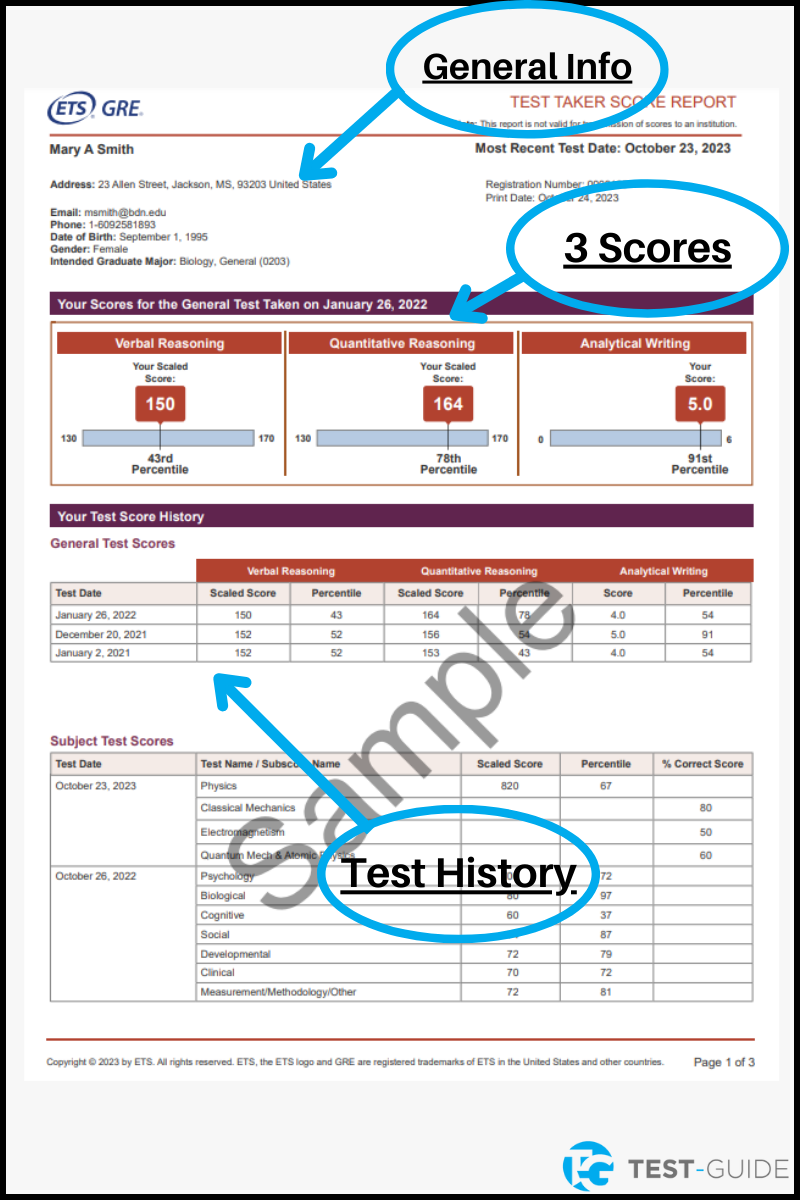Are you curious what a good GRE score is? A good GRE score is a 162+ on Verbal Reasoning and 168+ on Quantitative Reasoning.
These scores would put you in the 90th percentile of test-takers and make you a competitive applicant for many graduate programs.
However, a good score will vary and depend on the program you are applying to. Read our guide below to learn everything GRE score related.
| Verbal Score | Quantitative Score | Writing Score | |
|---|---|---|---|
| Top 10% Score (Great) | 162+ | 168+ | 5.0+ |
| Top 25% Score (Good) | 157 | 163 | 4.5 |
| 50% Score (Average) | 151 | 155 | 4.0 |
| Bottom 25% Score (Below Average) | 145 | 147 | 3.5 |
Summary: A good GRE score is anything above 162 for Verbal Reasoning and anything above 168 for Quantitative Reasoning.
Take our full-length GRE practice test to start preparing for your exam.
How is the GRE Scored?
You will receive 3 GRE scores on your score report. The GRE score range is from 130 to 170.
You will receive the following scores on your score report:
- Verbal Reasoning: 130-170
- Quantitative Reasoning: 130-170
- Analytical Writing: 0-6
The GRE calculates a raw score for verbal reasoning and quantitative reasoning. Those raw scores are then converted to a scaled score (130-170). The scaled score takes into account the difficulty of each question.
You will not receive a single total score (like most exams). Instead, you will receive the three scores listed above.
The verbal reasoning and quantitative reasoning scores are in 1-point increments while the analytical writing score is in 0.5-point increments.
If you want to see where you currently stand, take our free GRE test.
Average GRE Scores
Every year, ETS publishes data on GRE scores. Here are the updated average GRE scores:
- Verbal Reasoning: 150.94
- Quantitative Reasoning: 155.44
- Analytical Writing: 3.56
Even if you have an average GRE score, there is still a chance you might get into your desired program. Schools may value one part of your overall score higher than the other.
For example, for math-intensive programs, a high quantitative reasoning score combined with a lower verbal reasoning score could still get you admitted.
Each school is different, so it is best to aim for the highest score you can on every section.
Note: You cannot get a 150.94 or 155.44 on the exam. The scores are calculated in 1-point increments for verbal and quantitative reasoning and 0.5-point increments for analytical writing.
GRE Score Percentiles
A percentile score tells you how you scored when compared to other test-takers. If you scored in the 61st percentile, that would mean you scored better than 61% of other test-takers.
Here is updated data from ETS on GRE score percentiles:
| GRE Percentile | Verbal | Quantitative | Analytical Writing |
|---|---|---|---|
| 90%+ | 163+ | 169+ | 5.0-6.0 |
| 80-89% | 159-162 | 166-168 | 4.5 |
| 70-79% | 156-158 | 163-165 | – |
| 60-69% | 154-155 | 160-162 | – |
| 50-59% | 152-153 | 157-159 | 4.0 |
| 40-49% | 150-151 | 154-156 | – |
| 30-39% | 148-149 | 150-153 | 3.5 |
| 20-29% | 145-147 | 147-149 | – |
| 10-19% | 140-144 | 143-146 | 3.0 |
| 0-9% | 130-139 | 130-142 | 0.0-2.5 |
Receiving GRE Scores & Example Score Report
Your official GRE score report will be made available to you 8-10 days after you take your exam. You will receive an email from ETS when the report is available. You can also find this by logging into your ETS account.
On your score report, you will see the following:
- General Information (Name, Date of Birth, Address, Gender, Etc..)
- Verbal Reasoning Score & Percentile
- Quantitative Reasoning Score & Percentile
- Analytical Writing Score & Percentile
- Your Previous Test Scores (If Applicable)
What is a Good GRE Score for You?
What is considered a good score for one person may not be a good score for someone else. You will need to do the following research when determining what a good GRE score for you is:
- Determine Average Scores for Programs You Are Applying To: You can do some research of your own to determine what the average GRE scores were for the program you are applying to. This will give you a good baseline to aim for.
- Determine Which Portions of Your Score Your Program Will be Looking At: Some programs will only care about your quantitative score while other programs will only care about your verbal score. Some programs may care equally about all of your GRE scoring as a whole.
- Are There Thresholds for Incentives: Does your school or program have a certain score you need to be eligible for scholarships? Some schools may also have score requirements for placement in various courses in their program.
- Ability to Use Multiple Scores: Does your school take your highest score? Do they take your first score? Knowing this information can help you prepare better.
Frequently Asked Questions
How many GRE scores do you get?
You will get 3 different scores on your score report. You will get a score for verbal reasoning, quantitative reasoning, and analytical writing.
What is the GRE out of?
You will get a score between 130 and 170 for both verbal and quantitative reasoning. You will get a score from 0 to 6 for analytical writing.
What is the average GRE score?
The average GRE score is 150.94 for verbal reasoning, 155.44 for quantitative reasoning, and 3.56 for analytical writing.
How long are GRE scores valid for?
GRE scores are valid for 5 years from the date you took your exam.
Can you retake the GRE?
Yes, you may retake the GRE. You can take the exam every 21 days, up to 5 times in a 12-month period.


